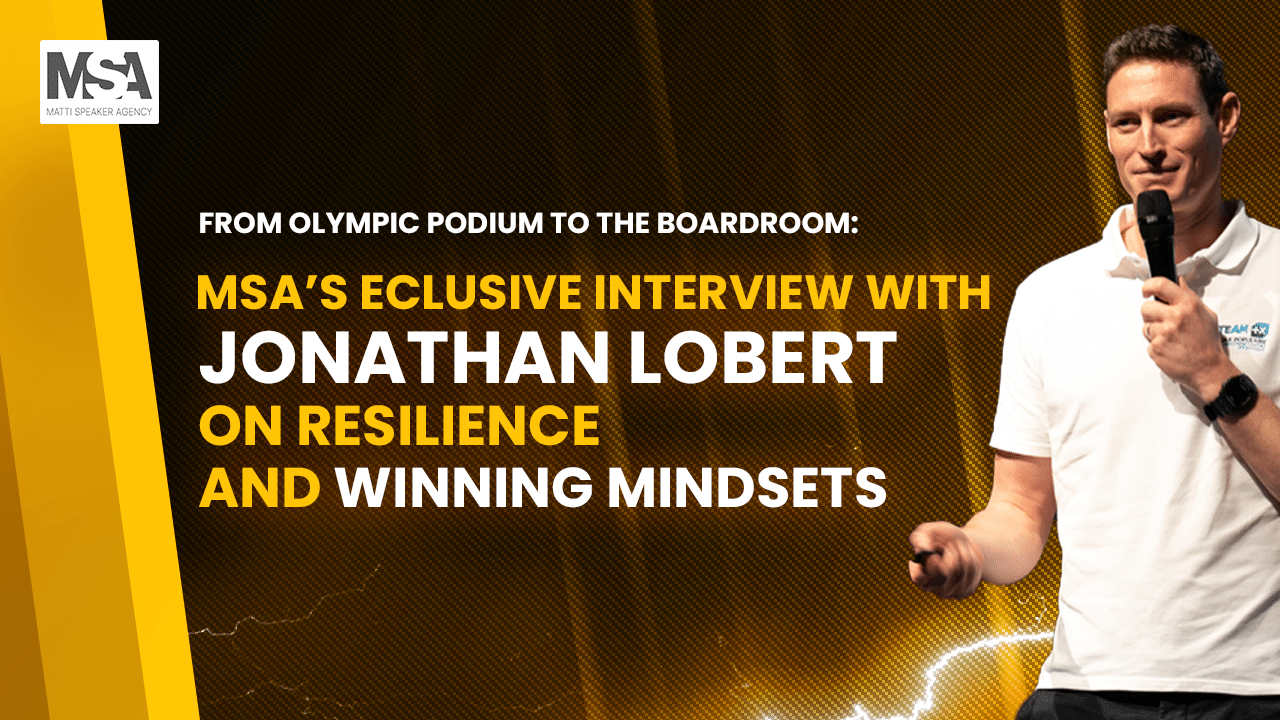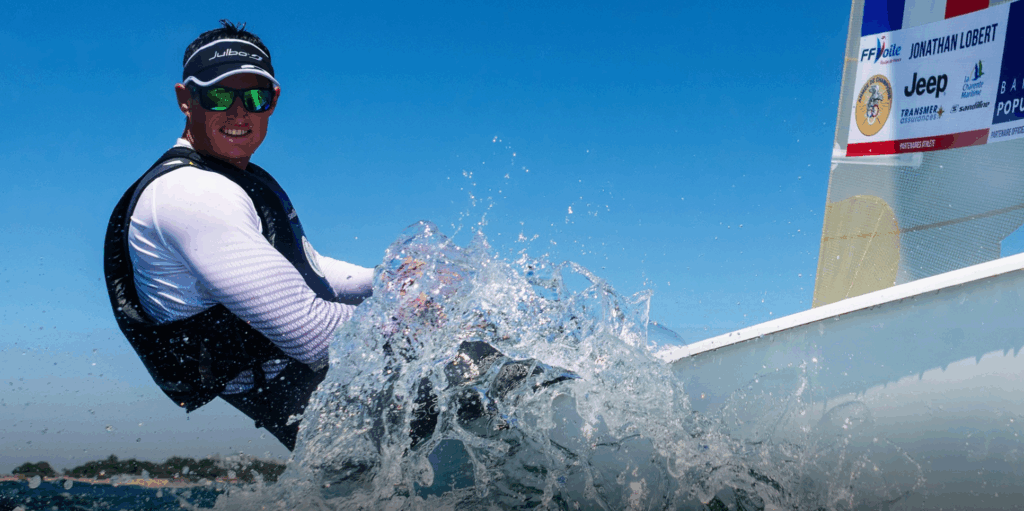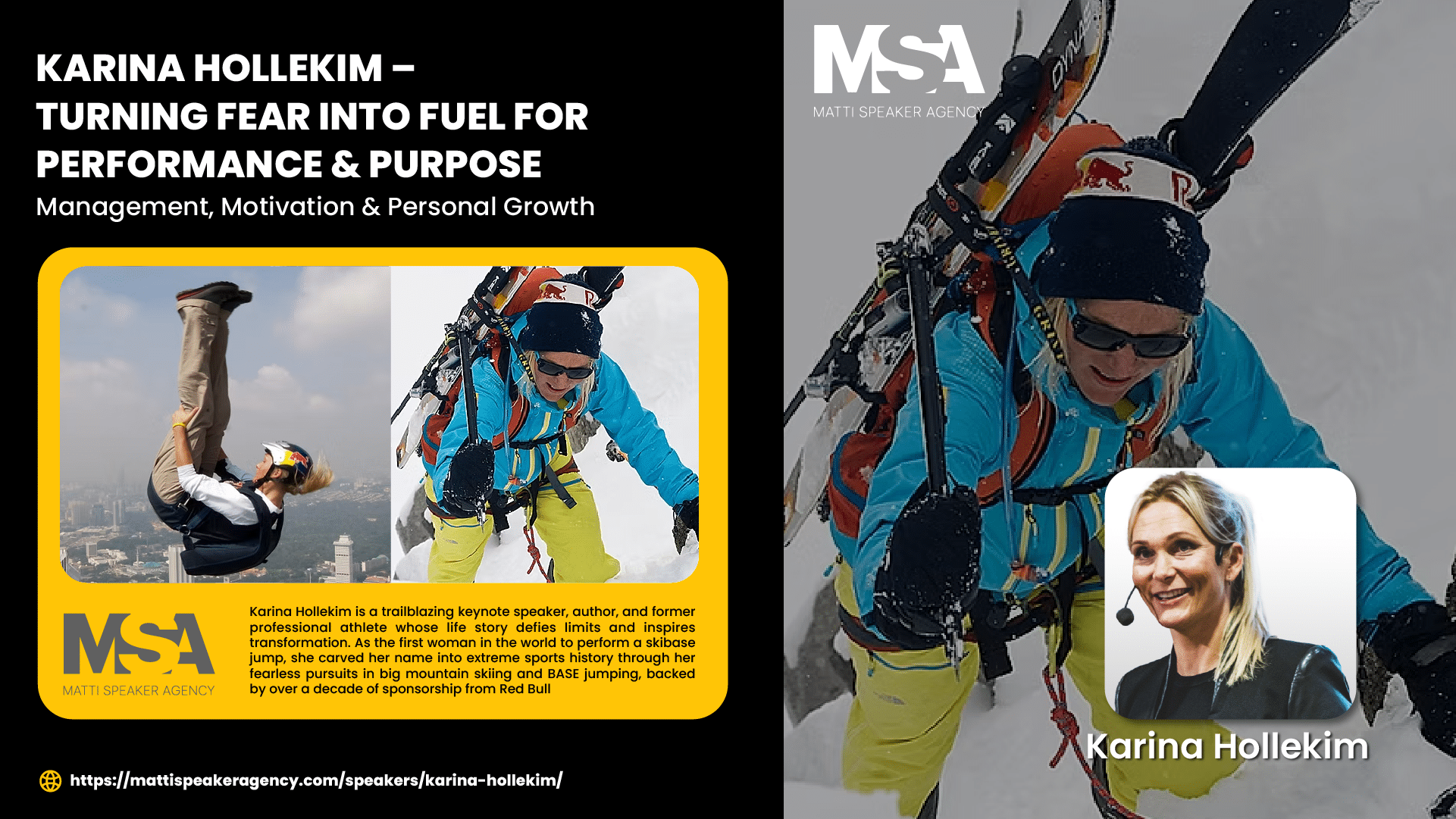Matti Speaker Agency is proud to present an exclusive conversation with Jonathan Lobert, the Olympic sailing medalist who has masterfully translated the principles of high-performance sport into powerful strategies for business leadership. In this insightful interview, Jonathan shares the lessons forged in the world’s most competitive arenas—from the paradoxical power of sharing to the art of decision-making under extreme pressure.
As a leading speaker agency dedicated to connecting organizations with transformative voices, we believe Jonathan’s perspective is more relevant than ever. He offers not just inspiration, but a practical roadmap for leaders and teams navigating today’s uncertain landscape.
Dive into our full interview below to discover how an Olympic champion’s journey can unlock your team’s potential.
An Exclusive Interview with Jonathan Lobert
1. You often say “Sharing is winning.” How did this mindset shape both your Olympic career and your work with companies today?
In Olympic sailing, there is only one athlete per country on the start line. This creates a unique paradox: to reach the Games, I had to train with teammates who were also my fiercest rivals. We pushed each other daily, knowing only one of us would ultimately represent France. At first, I saw sharing as dangerous if I gave too much, I feared losing my advantage.
But over time, I discovered something fundamental: when I shared my knowledge, my sensations on the water, even my doubts, I didn’t become weaker, I became stronger. Because in return, I gained new perspectives, richer feedback, and collective innovation.
This mindset opened the door to extraordinary collaborations. I worked hand in hand with engineers at Dassault Systèmes on the mast, and with the technicians of WB Sails on the sails. Together, we optimized the extremely complex mast-sail interaction, a system where every millimeter of adjustment can change a lot the feeling and the performance of the boat. Alone, I could never have achieved that.
For leaders, the lesson is clear: in organizations, silos and internal competition for resources often block progress. But when leaders foster a culture of openness and cooperation even with internal “rivals”, they unlock exponential value. Sharing doesn’t diminish individual success; it multiplies it.
That’s the essence of my keynote “Sharing is Winning”: helping leaders see that true performance is not built on protecting knowledge, but on amplifying it through trust and collaboration.
2. Looking back at your Olympic journey, what was the toughest challenge you faced, and how did you overcome it?
The toughest challenge was Rio 2016. Four years earlier in London 2012, I had won an Olympic medal. By Rio, I was a much stronger and more complete athlete, physically, technically, and mentally. I had built a world-class team around me, structured every detail of my preparation, and even became Vice World Champion just six months before the Games. Objectively, I was ready. More ready than ever.
And yet, at the very moment I was supposed to peak, I finished 14th. My worst result, at the worst possible time. Accepting that gap between who I had become and the outcome I achieved was extremely hard.
With hindsight, two key lessons emerged:
- First, that performance is not only about control, but also about freedom. In Rio, I carried the pressure to prove myself and to reward everyone who had supported me. That weight held me back. Since then, I’ve learned that the highest level of performance comes when preparation meets the ability to let go, improvise, and trust yourself and your team.
- Second, that even if the medal slipped away, nothing was wasted. The journey, the discipline, the innovations with Dassault Systèmes and WB Sails, the resilience through injury, the collective commitment remained. They became the foundation for the European title and World Championship medal I won soon after.
For leaders, the parallel is powerful: you can have the best team, the best plan, and be more prepared than ever and yet sometimes the result doesn’t come. But if you capture the learnings and keep your freedom to act, the experience becomes a springboard rather than a dead end.
This is the process I now help leaders and teams experience: how to accept, analyze, and re-engage after a setback, and above all, how to transform the journey, even without the medal, into the foundation of future performance.
3. Transitioning from elite sport to motivational speaking and management consulting is a big shift—what skills transferred most naturally, and which did you have to learn from scratch?
What transferred most naturally were the qualities forged by 25 years in high-level sailing: discipline, focus under pressure, and the ability to make decisions in uncertainty. In sailing, conditions shift every second, wind, waves, competitors. You never have perfect information, yet you must decide and commit. That mindset to get clarity in chaos, is directly relevant to leadership today.
But above all, my greatest asset has always been curiosity. As an athlete, I constantly asked questions: How can we go faster? What if we change this detail? What can I learn from other sports, other cultures, other technologies? This curiosity drove me to work closely with a wide range of profiles and skills like engineers, sailmakers, nutritionists, psychologists, and training partners from around the world. It allowed me to progress beyond my own limits and turn innovation into an advantage.
When I transitioned into business, curiosity remained my compass. I wanted to understand how organizations function, how leaders make decisions, and how my experience could be useful to them. That’s why I chose to return to school, completing an Executive Master at EM Lyon and a professional coaching certification at Université Paris-Dauphine. I didn’t want to just “tell my story”; I wanted to learn a new language and develop the right tools to accompany leaders in their own reality.
My singularity today lies in this double posture:
- On one hand, the lived experience of an Olympic medalist, who knows what it takes to prepare, adapt, and perform at the highest level.
- On the other, the curious learner turned professional coach and consultant, able to connect sports insights to concrete business strategies.
That combination makes my interventions impactful: not just inspiration, but practical, curiosity-driven frameworks leaders can immediately apply to transform their performance.
4. In today’s uncertain environment, resilience is a key quality for leaders. From your experience, what practical strategies can help managers build resilience in themselves and their teams?
In Olympic sailing, uncertainty is not the exception, it’s the rule. The wind shifts, the current changes, and your competitors adapt in real time. What looks like the shortest route to the finish is rarely the best. To succeed, you must constantly adjust your heading, sometimes even take what looks like a detour, to position yourself for the next wind shift.
That’s resilience: not clinging stubbornly to a straight line, but having the mindset and flexibility to turn risks into chances. Leaders face the same reality today, plans rarely unfold as expected, and resilience is about adapting fast without losing direction.
Three strategies from my experience translate directly to business:
- Clarity of purpose.
In sailing, my North Star was the Olympic medal. In business, it’s the company’s vision. When conditions change, clarity of purpose helps you keep momentum, even when the path is no longer linear.
- Recovery as a discipline.
Athletes alternate effort and rest to stay sharp. Leaders must do the same with their teams. Resilience is not about endless endurance, it’s about knowing when to pause and recharge, so you can bounce back stronger.
- Trust and psychological safety.
On the water, I relied on my coach and team to help me adjust strategy between the races. In organizations, resilience grows when leaders create spaces where people can share doubts and propose new routes without fear.
And one last ingredient: passion. After the disappointment of Rio 2016, what helped me rebuild was reconnecting with the joy of sailing, the simple spark that gives meaning to the effort. Leaders too must remember that passion is not a “nice to have”; it’s the fuel that keeps teams resilient over the long run.
For me, resilience is not about resisting the storm, it’s about adjusting your sails, changing your mindset, and turning risk into opportunity. That’s exactly what I help leaders and teams experience: how to navigate uncertainty with clarity, flexibility, and energy.
5. High-level sport requires constant decision-making under pressure. What lessons from competition do you believe are most valuable for business leaders facing complex challenges?
In sailing, you never have the full picture. The wind shifts, the current evolves, clouds appear, competitors make unexpected moves. If you wait for perfect certainty, you’re already too late. The key is to use the information you have in the moment, make a decision, and set the boat in motion.
Once you are moving, new information emerges: how the wind develops, how competitors react, how the boat responds. That allows you to adjust your plan and optimize your next decision. Progress doesn’t come from having the perfect answer upfront, it comes from engaging with reality, step by step, and refining as you go.
For leaders, it’s exactly the same. Complex challenges rarely come with complete data. Waiting for the “perfect” decision often leads to paralysis. The lesson is: act with clarity based on what you know now, then adapt as new information arrives.
Two lessons from my Olympic journey are especially relevant for leaders:
- Resilience through action.
In uncertain conditions, many freeze, waiting for clarity. But in sport as in business, clarity comes once you are moving. Taking action, even with incomplete data, gives you momentum and opens new perspectives. The worst decision is not a wrong one, it’s standing still that can make you sink. - Trust your intuition.
As an athlete, my body and instincts often detected shifts before I could fully rationalize them. Over time, I learned to trust those signals. In leadership, it’s the same: data is essential, but intuition shaped by experience and awareness often points in the right direction. The leaders who dare to follow their convictions inspire confidence and move their teams forward.
Ultimately, decision-making under pressure is about movement, adaptation, and learning. Leaders who embrace their mistakes as a new source of information will build the mindset to create organizations that don’t freeze in uncertainty, but instead advance, adjust, and grow stronger with every step.
“In sailing as in business, you don’t need the perfect plan, you need the courage to move, and the agility to adjust.”
That’s exactly what I bring in my workshops: an immersive experience where leaders live this process, deciding under uncertainty, adjusting with new inputs, and realizing that resilience and performance come from movement, not from waiting.
Bring an Olympic Mindset to Your Team
Jonathan Lobert‘s journey offers a powerful testament to the fact that resilience isn’t about resisting storms but learning to adjust the sails. His keynotes and workshops provide an immersive experience where leaders learn to navigate uncertainty, build collaborative strength, and turn challenges into opportunities.
Is your organization ready to move from planning to action? To build a culture where sharing multiplies success?
Contact Matti Speaker Agency today to book Jonathan Lobert for your next corporate event and empower your leaders with the clarity and courage of an Olympian.




